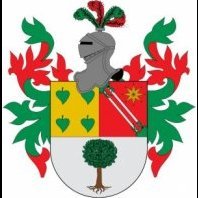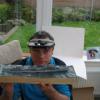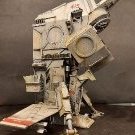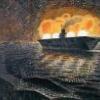-
Posts
826 -
Joined
-
Last visited
Angus Tura's Achievements

Obsessed Member (4/9)
2.4k
Reputation
-
Excuses, excuses... This has come to a bit of a pause because of the vagaries of oil paint. I've painted the leather on the horse's trapper and the rider in two sessions and the second one is playing up a bit. The second go has dried glossy so far: it's had a couple of days to dry already. The first lot, on the leather over the horse's rump, has a nice sheen but the second, on the horse's neck and the rider, is very glossy. I think it can only be the weather because the paint mixes are exactly the same. It'll set more matt in time, I think, but I'm a bit paused till it does. I should get on with the milestone, I suppose. I do love painting in oils but they can try one's patience. Thanks for looking, Alan
-
He (it?) is looking great, Nick. I'm a bit jealous of the freedom with colour that these fantasy things give you. You're handling the blue highlights very nicely: it's veering towards iridescence! Alan
- 22 replies
-
- 1
-

-
- Flesh of Gods
- 3D print
-
(and 1 more)
Tagged with:
-
Hello. Another very thin slice... This chap has taken slightly second place to another unfinished GB but has now leapt up again. In the style of Nick @Hunter Rose I thought I'd do a little step by step: I'm hoping these three pictures will end up side by side. In the first the face is undercoated. This was brushed on vallejo primer which colour of grey has stayed for the sclerae. Then the upper eyelashes have been painted on with raw umber oil paint and let dry: this takes a few hours umber being a very fast setting colour. Then the flesh tone has been painted on with Humbrol H61 flesh with a little H186 brown to make a slightly darker complexion. This is painted on very carefully around the eyes making sure the lower eyelids are painted but not the sclerae and leaving the upper lashes. It took two coats to get a good coverage. After 6 hours drying for each coat the irides and pupils were painted in with raw umber oil. This all seems a bit of a production but it means one can control the paint very well and correct each layer as needed on a completely dry base without lifting the previous step. It makes sure the eyes are the right size and symmetrical-ish. In the middle picture the face has been painted with oils following Danilo Cartacci's notes in his book: that is to say a palette, dark to light, of black, raw umber, burnt sienna, naples yellow and titanium white. The main thing I've learnt from that book is to paint the different elements of the face separately. That is to say, don't paint the whole face and then shade it, but rather, paint the brow, upper-lids, lower, lids, nose...&c. sequentially. This does work a lot better and it also means you can break off halfway through. In the third picture the face is finished apart from his teeth. Once the oils have set a bit and become less glossy the highlights of that glossiness go and it just needs the darkest shadows under the helmet and around his collar and helmet cord painted in with raw umber. I hope you like and that I'm not teaching GM to suck Es, Alan
-
Pat. Please sign me up. Either 54mm Yorkshire or 1/72 Scotland. Alan
-

Missile with a Man-F104 Starfighter STGB 18 and counting
Angus Tura replied to Marklo's topic in Groupbuild Proposals 2025
Please add me in, Alan -
Thanks @Hunter Rose and @Shotandshell. I don't know if anyone else here has done academic work? If you have you will know about Salami: publishing lots of papers on a single data set. I don't want to be accused of BM-Salami, but I have just had an inspiration. Those are sufficiently rare that I wanted to share. I previously posted this: and have been wondering about how to paint/whether to paint the wires holding the horse armour together. I have thought about a gold pen, or a small brush, but have been daunted by the prospect of either. I was just struck by the fact that the sculpting is so good that I could maybe just "stain" the wires: ...and it works a treat! This is Tamiya clear orange on the four wires in the middle. It's really quick to do, one can wipe off errors with tamiya acrylic thinner and, if I say so myself, it looks great: certainly better than I could do with a pen or brushed paint. I hope you like salami! Alan
-
Well, not quite! I had to think about this. I have never seen fortnight abbreviated before. Just a quick up date. Quite good progress considering how mental work has been for the last week. This semi-retirement thing is a lot like not retrining! The cloak and metalwork and leggings are done. All the leather is undercoated...but there's an awful lot of it. Oil-painting that is the next job. I have gone for straightforward leather colours. I understand that by the time of this figure (~350 A.D.) there were factories around the roman empire making the equipment, so I think it should be pretty uniform. His tunic, quiver & lance, crest, sword belt and shield will all be more unit-specific and colourful. The weird standing stone is a stand-in for a milestone with which I'm hoping to give him some context. I had thought that that would be much squatter and I had thought that it might be nice to stick a cat on top. However, I went on a small research mission to the Leeds City Museum yesterday and was surprised at how these things actually look: It's much taller and thinner that I thought. I would say it's about 6'. Also its not round, it much less dressed-stone looking than i thought, there certainly isn't room for a cat on top, and the text is barely engraved. This last is a good thing in terms of reproducing it. It's a fascinating thing, I think. There are two inscriptions for two succeeding imperial regimes, the latter of the two being the top one here. The context is upside down at the bottom (top) of the lower inscription: EB MP XX. That is to say 20 (XX) thousand (M) paces (P) to York (EB(oracum) See you later Alan
-
@AdrianMF. I just caught up with this: absolutely beautiful. Alan
-
Too true this is a great figure, and a great thread. I am more and more into figures since semi-retiring a bit more than a year ago: I do find it very time consuming, and painting absolutely exhausting. I always painted in oils in my teens tutored by Shep Paine in the Historex catalogue, and Philip O. Stearns in his book. I did try Rose paints which were a very early acrylic series specifically for miniatures, I think. I didn't get along very well with them. Now I come back to it and nobody, or hardly anybody, paints in oils! I do have yellow and red vallejo sets, because there isn't an orange one (!), which I wanted to try on the 2-dreamers Gagarin bust. I'm certainly inspired by this step-by-step to revisit that. In re Snow! I've got a 90mm figure I picked up under a table at a show last year which I want to do as knight at the Battle of Towton and this stuff looks like the answer! Thanks Nick! Alan
- 33 replies
-
- Flesh of Gods
- 3D print
-
(and 1 more)
Tagged with:
-
Thank you for the encouragement. I forgot to mention in starting this thread that the immediate spur to do this figure was a visit to the "Legion" exhibition at the British Museum. It is absolutely brilliant, if you like that sort of thing. Amongst the amazing things they have is a cataphract's horse armour from Dura-Europos in Syria via Yale in the US. I'm not sure whether or not the Syrian government is, Elgin-marble style, trying to get it back. I was aware of this thing, but I never thought I'd see it. Its Iron but 1750 years later it's a brown colour. You can't really see them in the picture but there are yellow-metal wires holding each scale to the backing. I had read that they were copper wires but they look more of a brass colour. I wanted the assembled horse and trappings, which are pretty hefty, on a good base/handle to paint. This is the kit-base bias-filed down and shortened with a hacksaw. Then little magic-sculp sausages around each hole covered with clingfilm and the horse put back on to shape the magic-sculp. Then the magic-sculp carved back flat and the road way under the horse made of more magic-sculp and then the horse stuck on with slow-setting araldite. So now ready to start painting. The bare metal has been polished with a brass brush (for suede shoes), washed and left to dry. I think it's important to do this just before painting it as it starts to dull down as soon as it's polished. Danilo Cartacci says to do an oil wash over the metal followed by Tamiya Smoke X-19. I've preferred to reverse those so as to have a more sealing layer on first. I think that the X-19 base is easier to oil-wash too than the bare metal. Here are the horse and rider done. The oil-wash was Rowney Artist's Ivory Black: The shield boss and spear point have had the same layers. The chainmail of his lorica hamata has had a thicker wash than the plate armour but could do with another coat. I'll do it with shading and highlighting the rest. It is a very long time since I painted a horse: 40 years anyway. I wanted to try painting the horse in more than one colour in keeping with these notes by Eugene Leliepvre in the Historex catalogue of about 1982. The problem I've thought about with this is that the "lower surface" colour is lighter than the "upper surface" but should be the part in shade. The fact that the trapper hides most of the horse makes this the ideal try-out, I think. I've undercoated with Revell Matt 84 Leather Brown and then the under surfaces are W&N Vandyke Brown and the upper W&N Raw Umber, both as the darkest shade and lightened with Naples Yellow. The feet are Rowney Davy's Grey with Ivory Black and Titanium White. Next up are the riders cape and trousers and make a start on the wires holding the armour scales in place.... Thanks for looking, Alan
- 18 replies
-
- 12
-

-
Hello. I'm trying to build a collection of soldiers, and people more generally, from or in Yorkshire, but particularly wanted to do this Soldiers 54mm Roman Cataphract when it appeared some years ago. Equites cataphractarii iuniores were a cataphract unit attached to the field army of the Comitatus Britanniarum. So, while they were normally stationed in London I think it's conceivable that they would spend some time at least in York. I hope that's not too fanciful Here is the box and bits and pieces. In my teens I was a big devotee of 1970s Military Modelling Magazine, which often mentioned "white metal disease". I've never seen it or heard of any one else seeing it, but I have had a horror of it since ~1975! So, here are the horse halves and trapper primed after polishing and washing. I didn't fancy Tamiya spray-can primer because it is freezing in 2024 Yorkshire and I like to use it outside, and so tried Vallejo airbrush primer for the first time. 'Seems good but Vallejo say it needs 12 hours to dry properly and they're not wrong. It's pretty tough after it has properly dried. Here is the whole thing assembled, and broken-down again to paint. Separate components are pinned with 1.2mm brass. I've replaced the spear with a brass tube (1/16") and put some 0.8mm tube between that and the drilled-out ferule of the spearhead. I wanted him holding the reins and not his spear. So, the spear's shaft has been drilled out long-ways from his hand and then the rest carved back and new finger spaces carved into the back. With the thumb and index finger squeezed together I think it looks quite good for holding the reins. The javelin quiver has had a couple of bits of aluminium tube glued to it to hold the spear. I had thought I would have to move his left shoulder and elbow to get it in a convincing position but have found it's OK as is: I'm interested that the box-top image isn't in the pose that the pieces end up in with careful fiddling about. Before making the alteration to the left hand, the pose was a lot more convincing that the box with the lance being held across the horse and not on the right side, in spite of the fact that it's in the cataphract's left hand. See you later. Alan
- 18 replies
-
- 16
-

-
Hello. Here are two FeR vikings posed as if coming through the dunes on the coast of Yorkshire. I started then literally years ago but they finally made it over the line in the recent KUTA GB. They are painted with oils over enamels with Vallejo Natural Steel, and Humbrol brass and gold with gold printers' ink, for the metals. The base is Das clay with Treemendus fake-fur grass, , El Viejo posidonia roots, chinchilla dust and stippled Mr.Surfacer 500 sand. Thanks for looking. I hope you like them. Alan
- 5 replies
-
- 18
-

-
An awfully long time ago I started this in Figures WIP, before doing most of it in the Not-my-Comfort-Zone GB, and finally getting it finished in KUTA 2023. It's an approximately 90mm Berliner-Zinnfiguren/Rieger vignette of St.Hubertus of Liege (Luettich). Slight modification of the casting to move his left foot and add the crocuses, and all painted in oils over enamels with some fluorescent white pigment powder in the celestial rays and cross. An awful lot learned and a lot more to be learned! Sorry for the delay! I hope you like it. Alan
- 3 replies
-
- 12
-

-

Grand Moff Tarkin 1:4 scale bust
Angus Tura replied to Glen10k's topic in Figure Ready for Inspection
Great painting, especially wrinkles! In 1:4 scale, with the base, that must be about 50cm? Anyway, Love it, Alan -
Hello. This is the BPK kit started in the Xmas BB GB but finished in KUTA GB. I've made the prototype version for which there are decals in the box. It's not armed. This is a relief as the missiles in the box come as two injection molded halves and then eight photoetched fins each. A lot of the details are photoetch in this and I've ended up replacing quite a few with 15 thou. card. There isn't any positive locating points for the etch and they kept breaking off. The front canard-like aerials. pitots and front gear doors are the kit photoetch. Painted with Mr.Color (C2) gloss black and C307 FS360320 (u/c and sensor globe) without an undercoat, except for Mr.Metalprimer on the etched parts used. Kit decals. The white (H34) and grey details and propeller (H106 and H126) are brush painted Humbrol. Varnished with Mr.Color semi-gloss (C182). Chrome on the pitots, oleo and wing-tip lights is brush-painted Molotov Ink over painted with AK Gauzy or Tamiya clear colours for the lights. This is a nice little kit, but fiddly. I'm looking forward to having another go at it as there are two in the box. I hope you like it. Alan
- 2 replies
-
- 15
-

-








